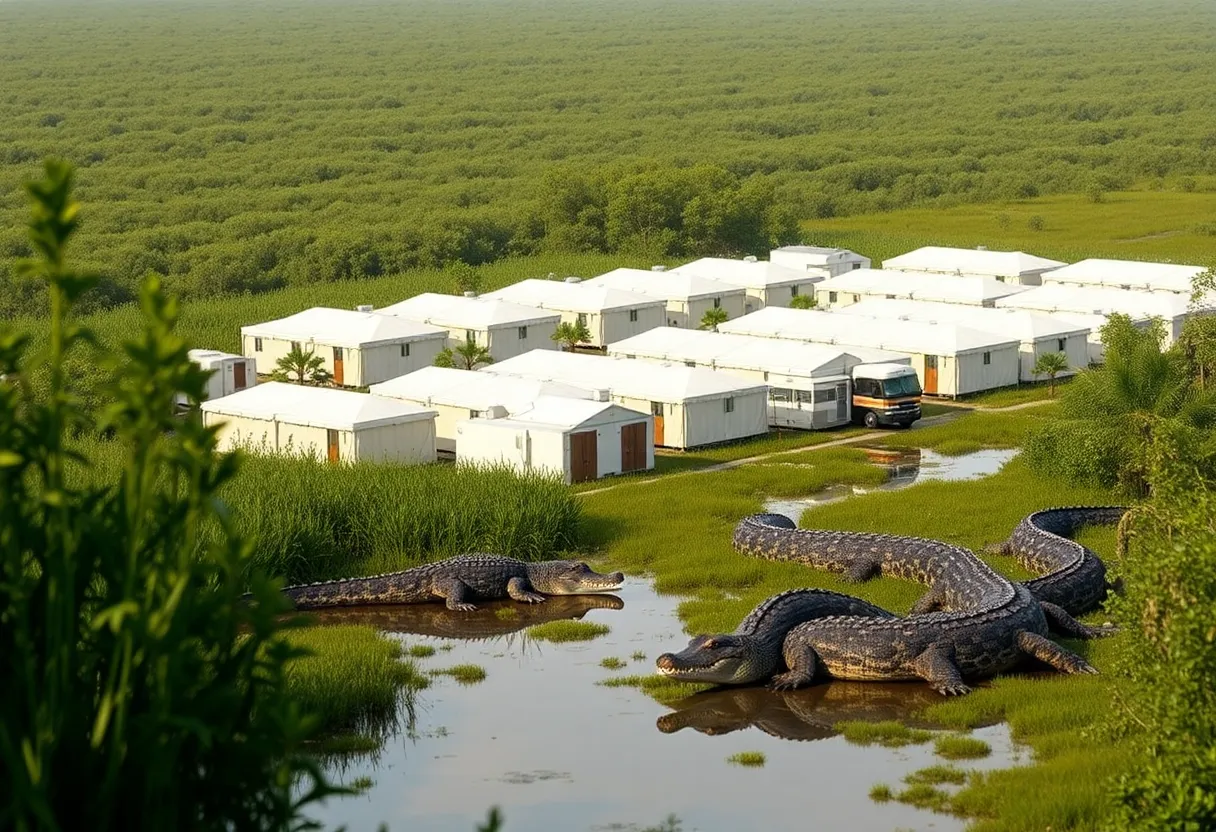

Rendering of the Alligator Alcatraz immigration facility, designed with light infrastructure.
Want to target the right audience? Sponsor our site and choose your specific industry to connect with a relevant audience.
Prominent brand mentions across targeted, industry-focused articles
High-visibility placements that speak directly to an engaged local audience
Guaranteed coverage that maximizes exposure and reinforces your brand presence
Interested in seeing what sponsored content looks like on our platform?
May’s Roofing & Contracting
Forwal Construction
NSC Clips
Real Internet Sales
Suited
Florida4Golf
Click the button below to sponsor our articles:
Sponsor Our ArticlesThe federal government has approved funding for a new immigration detention center in Florida, aptly named ‘Alligator Alcatraz.’ Located in the Everglades, it will house up to 5,000 detainees, focusing on immigrants with criminal records. Despite the urgency of its construction, local leaders express concerns regarding the environmental impact on the fragile ecosystem. As construction begins, the facility is intended to enhance immigration enforcement in Florida under the Trump administration’s policies, sparking debates around border security and community safety.
In an exciting development for immigration enforcement in Florida, the federal government has taken a significant step forward by approving funding for the establishment of various immigration detention centers in the Sunshine State. At the heart of this initiative is a proposed site nestled in the vast Everglades, charmingly dubbed the “Alligator Alcatraz.” This facility is set to house immigrants with criminal records as part of the broader strategy to address immigration issues under the leadership of the Trump administration.
The bulk of the funding for these detention centers will come from the Federal Emergency Management Agency’s (FEMA) shelter and services program. This program is designed to assist cities and organizations grappling with an influx of migrants and asylum-seekers. The urgency of this project is emphasized by Florida Attorney General James Uthmeier, who has confirmed that plans for expanding the federal government’s capacity to detain immigrants are moving forward at a brisk pace.
The Everglades site, set to repurpose a large and mainly abandoned airfield, is expected to have the capacity to house up to 5,000 detainees. Construction on the facility is already underway, with work starting just this Monday morning. By the time early July rolls around, the facility should be ready for operations.
Uthmeier emphasizes that Alligator Alcatraz is designed to be secure, taking advantage of its unique natural surroundings that include alligators and pythons. He paints a picture of a facility that will feature light infrastructure, making use of tents and trailers rather than heavyweight permanent structures.
However, this proposal has raised eyebrows, especially among local leaders concerned about the potential environmental impact on the delicate ecosystem of the Everglades. Miami-Dade County Mayor Daniella Levine Cava has voiced her apprehension over the facility’s potential effects and is calling for more detailed information regarding the security risks it could pose to both the environment and the community.
The purchase price for the facility’s new location has been set at a surprising $20 million, particularly noteworthy when considering it was appraised at approximately $190 million. This significant discount raises questions about the deal and how it may affect future operational costs. Projections suggest that running the facility could cost around $450 million per year, with plans to seek reimbursement from FEMA to help ease the financial burden.
This initiative aligns with efforts from various Republican-led states to reinforce stringent immigration policies backed by the Trump administration. Law enforcement in these states, including Florida, are now working to enforce federal immigration laws more rigorously, reflecting a nationwide push to tackle illegal immigration issues more effectively.
While the plans for Alligator Alcatraz push forward, they also face considerable opposition. Residents and environmental advocates are voicing their concerns, leading to protests focused on both the implications for local communities and the potential ecological disruption in the Everglades.
The plan’s progression emphasizes Florida’s leading role in immigration enforcement, which is seen as a critical aspect of national policy. As the developments unfold, local officials are committed to collaborating with the Trump administration to tackle illegal immigration issues head-on.
As Alligator Alcatraz moves from concept to reality, it remains to be seen how it will impact the lives of many individuals and the surrounding environment. The balance between enforcement and community concerns is sure to be a topic of discussion in the weeks to come.
}
News Summary The Cincinnati Bengals have signed linebacker Demetrius Knight Jr. to a four-year rookie…
News Summary A South Carolina man has been sentenced to 25 years in prison after…
News Summary Anderson 'Chase' Childers, a former police officer, tragically drowned while rescuing swimmers from…
News Summary Betty Jean Neel Spears, a dedicated family member and community service advocate, passed…
News Summary President Trump has signed the GENIUS Act, the first major federal legislation aimed…
News Summary The U.S. Secretary of State has revoked the visa of Brazilian Supreme Court…